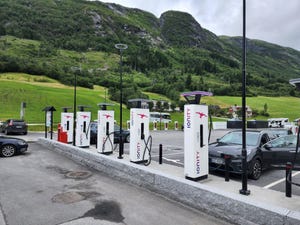
EV Charger Capacity Predicted to Overtake Rooftop Solar in 2023 - CNET
EV Charger Capacity Predicted to Overtake Rooftop Solar in 2023
A new report credits US incentives for spearheading the expected growth.
It’s an unusual but telling statistic: In 2023, for the first time, the annual installed capacity for electric vehicle chargers will overtake distributed solar in the US, according to Wood Mackenzie’s 2023 US Distributed Energy Resource Outlook report, released this week. Wood Mackenzie is a research, insights and consultancy service focusing on insights into global energy and natural resources.
Distributed solar generally refers to rooftop solar panels on homes and businesses. Right now there’s a generous tax credit for homeowners looking to install rooftop solar. And thanks to such incentives, the cost of solar panels will likely keep falling. CNET compares the best solar companies here.
EV charging capacity outstripping rooftop solar is mainly due to the $1.2 trillion infrastructure bill passed in November 2021, which set aside $7.5 billion to create 500,000 public EV chargers across the US by 2030.
Can solar panels save you money?
Interested in understanding the impact solar can have on your home? Enter some basic information below, and we’ll instantly provide a free estimate of your energy savings.
“Federal incentives, headlined by the Inflation Reduction Act tax credits and National Electric Vehicle Infrastructure grant program, represent the greatest catalysts for growth” in the United States market for distributed energy resources, said the report’s lead author, Ben Hertz-Shargel.
The DER market in the US, which includes EV chargers and solar panels, is expected to almost double between 2022 and 2027, with capital expenditure reaching $68 billion, the report projects.
Can solar panels save you money?
Interested in understanding the impact solar can have on your home? Enter some basic information below, and we’ll instantly provide a free estimate of your energy savings.
Read more: Inflation Reduction Act Tax Credits and Rebates: Save On Home Energy Upgrades With These Incentives
EV market growth
The electric vehicle-charging infrastructure market will reach $20 billion by 2027, the report says. That’s led by the residential Level 2 and public DC fast-chargers segments, coming in at $6.5 billion and $5.6 billion, respectively.
Most of the charging capacity will remain residential, though that share will decrease. Infrastructure for buses and trucks will continue to grow, reaching 18% of total charging capacity by 2027.
As well as the federal infrastructure bill, some states are pushing EV charging, including a new law in Illinois that will require all newly built homes to have EV charging ports. Electric vehicle sales increased 65% last year alone.
If you’re looking into buying an EV, you can read more about CNET’s picks for the best electric cars and EVs for 2023, as well as every EV available in 2023, ranked by range, 12 places you can charge your EV for free and how almost any electric vehicle can qualify for the $7,500 EV tax credit.

